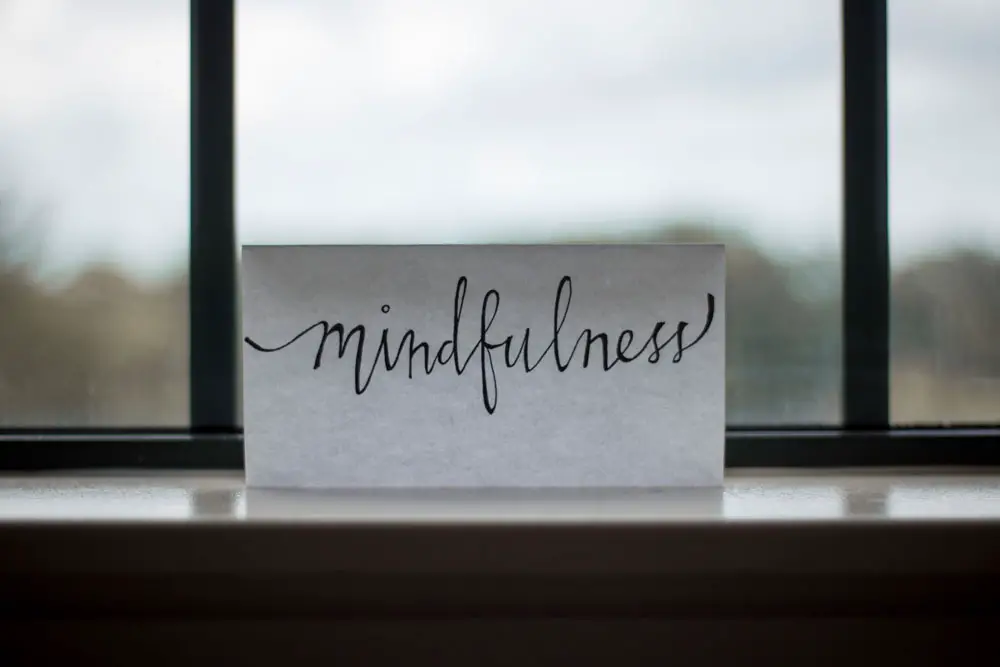Boost Confidence and Self Esteem by Mindful Living
A Mindful Method to Boost Confidence and Self Esteem
Having confidence means that you view yourself favorably. You know that you can do what you need to do, that you have the skills and talents to be able to handle yourself.
You trust that your instincts, thinking, and abilities are sufficient. When you don’t have confidence it means that you struggle to accept who you are.

You’ll lack the confidence to do things because you simply don’t trust that you can.
You go through life feeling as if you’re not educated enough, skilled enough, smart enough, talented enough, pretty enough, or handsome enough. You judge yourself, often thinking of what you could have, should have said or done, and you always fall short.
What mindfulness does to help you change this and build your confidence is to replace the feelings that you’re not enough with the trust that you are.
Using mindfulness calls for you to not dwell on your past or on any negative experiences where you feel that you failed or fell short.
It helps you to not focus on the future or on what you hope to be and it helps train you to focus on who you are right now and see that who you are is good enough. You learn to accept yourself – and with that, strong confidence in yourself is built.
Practicing mindfulness can also boost your self-esteem. Mindfulness can lead you to a life settled in the present. With living in the present comes a non-judgmental acceptance of who you are.
So many people have an internal voice that’s extremely ugly. This internal voice has been conditioned to speak this way by us. The disturbing results are that when we allow this internal voice to have a negative way, we can trigger stress, anxiety and even depression.

This self-talk has a direct impact on how you feel about yourself.
Learn to be aware of this negative self-talk. If you call yourself names, that’s a sign that you’ve been engaging in negative self-talk that can lower your self-esteem.
Some people call themselves stupid or an idiot. When they consider doing something, this internal self-talk always tells them why they can’t. You’ll tell yourself things like “I’m not smart enough” or “I’m too dumb to do it.”
When you allow these thoughts to run rampant, you can get into the mindset that you can’t do something – that you’re unworthy – and then your feelings follow that internal self-talk until it becomes a belief.
This habit can be so ingrained within you that the negative self-talk plays constantly in your mind, so much so that it becomes like white noise. What mindfulness does is bring your attention to the inner dialogue that’s eroding your self-esteem.
You learn what this internal conversation is doing to you and how it’s impacting your emotions. Mindfulness helps you learn to accept who you are without expectations or blaming. You’ll gain skills that you can use to learn how to raise your confidence and acceptance of yourself.
Here are the 7 things you can do to boost confidence and self esteem:

-
See yourself as you want to be.
When we struggle with low self-confidence, we have a bad perception of ourselves that most of the time is not even true. Practice picturing a fantastic version of yourself, achieving your goals.
Affirmations are positive statements that can help you to challenge and overcome self-sabotaging and negative thoughts. When you repeat them often and believe in them, you can start to make positive changes.
We tend to behave in accordance with our own self-image. The trick to making lasting change is to change how you view yourself.
-
See yourself as being equal to everyone
People with low self-confidence see others as better or more deserving than they are. They are not better or more deserving than you. Change your mind to an equality mentality and you will automatically see an improvement in your self-confidence.
-
Self-Care
“Accept yourself. Love yourself as you are. Your finest work, your best movements, your joy, peace, and healing come when you love yourself. You give a great gift to the world when you do that. You give others permission to do the same: to love themselves. Revel in self-love. Roll in it. Bask in it as you would sunshine.” – Melodie Beattie
Self-confidence is a combination of good physical health, emotional health, and social health. It is hard to feel good about yourself if you do not like your physical appearance.
Make time to cultivate great exercise, eating and sleep habits. In addition, dress to impress. Build your self-confidence by making the effort to look after your own needs.
-
Learn to Say No
“Whether they’re family or friends, manipulators are difficult to escape from. Give in to their demands and they’ll be happy enough, but if you develop a spine and start saying no, it will inevitably bring a fresh round of head games and emotional blackmail. You’ll notice that breaking free from someone else’s dominance will often result in them accusing you of being selfish. Yes, you’re selfish, because you’ve stopped doing what they want you to do for them. Wow. Can these people hear themselves?!” ― Rosie Blythe, The Princess Guide to Life
Learn to say no. Be more assertive and learn to ask what you want. The more control and say that you have over your own life, the greater will be your self-confidence.
-
Instead of focusing only on “to-do” spend time reflecting on “did-it” list
“Winning is fun…. Sure. But winning is not the point. Wanting to win is the point. Not giving up is the point. Never letting up is the point. Never being satisfied with what you’ve done is the point.” —Pat Summitt
Too many people are disheartened because they set themselves goals that are too difficult to achieve. Start by setting yourself small goals that you can win easily.
Reflecting on the major milestones, projects and goals you’ve achieved is a great way to strengthen confidence in your skills.
-
Help Someone
Instead of focusing on your own weaknesses, volunteer to mentor, assist or teach another, and you’ll see your self-confidence grow automatically in the process.
It also feels good to be able to make a difference for someone.
Mindful Self Compassion Helps You Live a Better Life

When you have compassion for yourself, it means that you treat yourself kindly despite times you feel that you’ve messed up somehow. Mindful self-compassion means that you foster thoughts that make it easier to be your best self while treating yourself well.
Self-compassion is a struggle for some people because they have a reel that plays in their head that constantly berates them, telling them how they failed or how that they’re not worthy.
For others, it’s a struggle because they may have had situations from their childhood years where others who should have been kind to them weren’t. It’s never too late to learn self-compassion and how to apply it to your life.
When you practice mindful self-compassion, it means that you put a stop to that negative talk inside your mind that you let beat yourself up. It also means that you treat yourself kindly in your day to day living.
You stop doing things that are detrimental to your physical health or to your emotional health. Some of the things that self-compassion may help you to let go of is working too much, unhealthy eating habits, giving in to stress and putting up with relationships that aren’t good for you.
Mindful self-compassion allows you to see your faults, but not dwell on them. It allows you to recognize that you’re human and enables you to let go of past mistakes that you still hold over your own head.
Not only will you learn how to treat yourself kindly and lovingly, but you’ll be able to do the same toward others.
When you understand self-compassion, it can help you be able to bring emotions under control. Listening to soft relaxing sounds, bird music and sounds can also help in this aspect.
This will let you stop allowing stress to push you toward anxiety or sadness or frustration. It will also help you be able to react to things without blaming yourself. You’ll learn how to treat yourself with respect and how to encourage yourself rather than shaming who you are or things you’ve done.
Learning how to use mindfulness to find self-compassion doesn’t mean that you believe you have no faults. It means that you don’t call yourself names, you don’t think of yourself as a bad person.
You just love yourself as is, faults and all. For people who have trouble grasping the concept of self-compassion, think of the way that you treat the people that you really love.
You treat them kindly. You show understanding for their faults and you let it go when they let you down. That’s the same way that you need to treat yourself – like a trusted and valued person that you love and want good things for.
Accept and Empower Yourself with Mindful Strategies

The way that you conduct yourself in your personal and professional life begins with how you use your mind. You can teach your mind to accept yourself and gain empowerment – or you can stay stuck in self-defeating behaviors.
You are what you think. When you want to introduce change into your life, you need to first accept and empower yourself before you begin altering anything. Your mind is the greatest tool that you have for living the best possible life that you can live in.
Countless studies have shown that the brain is constantly working. Your brain can be wired to think or cause you to act in a certain way based on how you handle your mind’s ability to tap into your subconscious mind.
When you practice mindfulness, you can empower yourself and fine-tune the subconscious abilities that you have. Using mindful strategies, you’ll be able to focus better, lower your stress and boost confidence and self-esteem in yourself.
Once you learn to accept yourself, you’ll be able to have compassion for yourself, too.
This will defeat any negative internal talk that you may have been practicing. Meditation is a strategy that you can use to achieve mindfulness in order to accept and empower yourself.
It helps users quiet the mind so that they can be fully in the present and accepting of the emotions and thoughts that they have. Choose a place where you’ll be comfortable so that you’ll be able to feel relaxed.
Some people choose to sit while meditating and others prefer to lie down. You can also practice mindful meditation while you’re walking outside or in your home. Relax and focus on what’s around you and how you’re inhaling and exhaling.
Be aware of the sensations you feel and the emotions that you’re experiencing. Another strategy that’s often used is deep breathing. You can start this the same way that you would with mindful meditation where you find a comfortable place and begin.
But you can also practice deep breathing while you’re active at home or at work. You focus on drawing in deep breaths and slowly releasing them. You can also use mindful replacement techniques.
These are strategies that call for you to be aware of the thoughts you think about yourself rather than simply letting them pass through your mind. They should help you boost your confidence and self esteem. Whenever any negative self-talk pops into your mind, you make a conscious choice to stop and correct the thought.
You correct it by replacing it with affirming words that help you accept yourself as you are. This helps you reprogram your thoughts to enable you to feel empowered rather than listening to words that hinder you and create self-doubt.



Leave a Reply